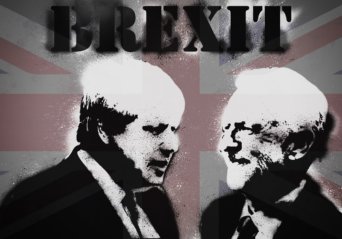- About
- Topics
- Picks
- Audio
- Story
- In-Depth
- Opinion
- News
- Donate
- Signup for our newsletterOur Editors' Best Picks.Send
Read, Debate: Engage.
| topic: | Election |
|---|---|
| located: | United Kingdom, USA |
| editor: | Gurmeet Singh |
British elections. Is there a more dull coupling in all of the English language? White bread, maybe. Grey sky. Nigel Farage. No, at least he is occasionally worth talking about.
British elections, over the last twenty or so years, have not really been events. They don’t have the stadium-filling, game-time ‘big event’ feel of the American variety (though I’m not sure this is desirable, anyway), nor are they conducted with any real passion or vigour, as in say, France, or India. British elections tend to be rather dull affairs: choose between a party that loves business and is OK with people of colour and LGBTQ people, or a party that loves business and is not OK with people of colour and LGBTQ people.
Brexit has transformed all of this. There is now a real possibility for change in the UK, and by extension, Europe and the US. Jeremy Corbyn has made the Labour Party a real force for good once again.
He is not the most popular leader however. Firstly, many MPs in his own party do not trust his “electability”, and have yearned for someone more in the mould of Tony Blair; someone without real convictions, who could please the media with empty sound-bites. MPs like Chuka Umunna fled the party and joined the most protean of groups: the Liberal Democrats. A party ostensibly for social change in Britain, but one which is directly responsible for the rise in austerity, homelessness, poverty and social breakdown.
Secondly, Corbyn has been accused of being an antisemite. This is too big an issue, and warrants its own article, but from my perspective, Corbyn is less an antisemite as much as he is clumsy. He hadn’t taken the issue of antisemitism in the party seriously enough, and for this he and his managerial group should be held responsible; I believe they have taken responsibility for it.
Thirdly, the media have made a clear and concerted effort to undermine Corbyn. Intellectuals ranging from Noam Chomsky to David Graeber have made public their belief that the media have targeted Corbyn to undermine him, including exaggerating and inventing claims of his supposed antisemitism. This has happened in marked contrast to the media’s focus on Boris Johnson and the Conservative Party’s own racisms.
Finally, there is something rather difficult to explain about British culture, but something that maybe can be explained with reference to George Orwell. One purpose of education in Britain, argued Orwell, is to educate intelligent people out of certain beliefs – to render certain beliefs ‘embarrassing’, or unpalatable. Corbyn has for many people fallen into this category: it’s simply unpalatable to support him, because it’s not the ‘done thing’ to support a politician who wants to actually change things. It’s unrealistic, impractical, juvenile. In a word, embarrassing.
And yet, here are some of the embarrassing policies in his manifesto:
'Free broadband?’ critics have shrieked. How crazy! And yet, how perfectly sane: to offer people the country over the chance to connect to the internet for free. Lack of access to the internet, whether through poor connections or prohibitive costs have been shown to keep people in poverty – if you want to apply for a job but don’t have or can’t afford to use the net, how will you do it?
What’s more, there’s the party’s Brexit policy, which despite the hysteria is clear: respect the referendum result of 2016, negotiate a new and fairer deal with the EU, and put this deal up to another referendum with remain as an option. In other words, ‘No Deal’ is off the table.
Corbyn’s Labour party may be the last chance for the UK to endorse a serious and electable socialist-inspired manifesto which would benefit the entire country. Boris Johnson’s Conservatives – a group well-known for their mendacity, elitism and sometimes illegality – look set to win, however, and achieve their long-sought-after ‘No Deal Brexit’. They will probably end up winning, and selling the National Health Service to the Americans, as Corbyn and his Labour Party have warned.
If that’s ultimately what the UK wants, then of course, fine. But I’m also certain the public has simply been lied to and brainwashed out of voting for a party who would ultimately support and benefit them. It’s a once in a generation chance to give power back to the people. Hopefully, the people will take it.
Image: Pete Linforth/Pixabay

